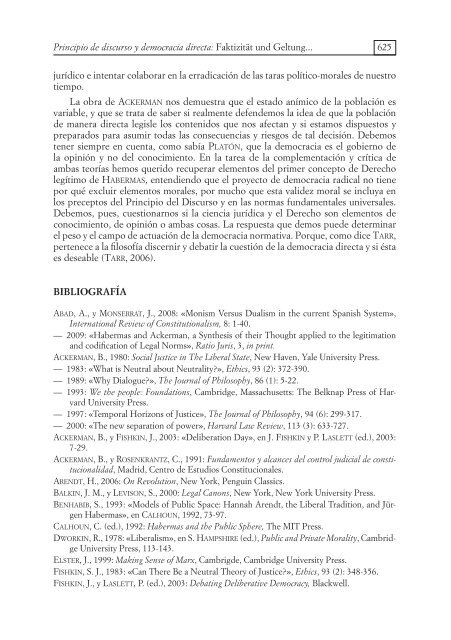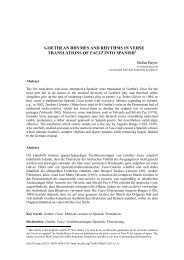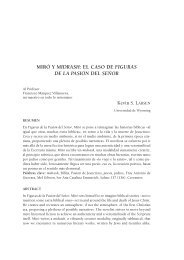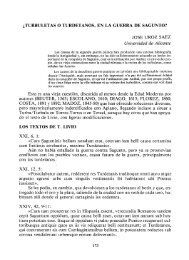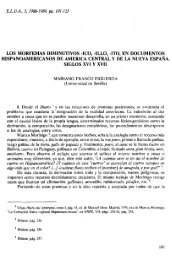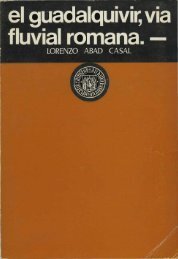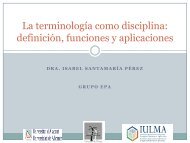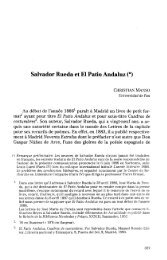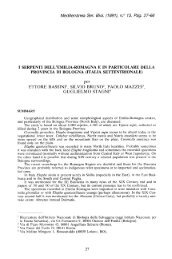Principio de discurso y democracia directa: Faktizität und ... - RUA
Principio de discurso y democracia directa: Faktizität und ... - RUA
Principio de discurso y democracia directa: Faktizität und ... - RUA
Create successful ePaper yourself
Turn your PDF publications into a flip-book with our unique Google optimized e-Paper software.
<strong>Principio</strong> <strong>de</strong> <strong>discurso</strong> y <strong>de</strong>mocracia <strong>directa</strong>: <strong>Faktizität</strong> <strong>und</strong> Geltung... 625<br />
jurídico e intentar colaborar en la erradicación <strong>de</strong> las taras político-morales <strong>de</strong> nuestro<br />
tiempo.<br />
La obra <strong>de</strong> Ack e r m a n nos <strong>de</strong>muestra que el estado anímico <strong>de</strong> la población es<br />
variable, y que se trata <strong>de</strong> saber si realmente <strong>de</strong>fen<strong>de</strong>mos la i<strong>de</strong>a <strong>de</strong> que la población<br />
<strong>de</strong> manera <strong>directa</strong> legisle los contenidos que nos afectan y si estamos dispuestos y<br />
preparados para asumir todas las consecuencias y riesgos <strong>de</strong> tal <strong>de</strong>cisión. Debemos<br />
tener siempre en cuenta, como sabía Plat ó n, que la <strong>de</strong>mocracia es el gobierno <strong>de</strong><br />
la opinión y no <strong>de</strong>l conocimiento. En la tarea <strong>de</strong> la complementación y crítica <strong>de</strong><br />
ambas teorías hemos querido recuperar elementos <strong>de</strong>l primer concepto <strong>de</strong> Derecho<br />
legítimo <strong>de</strong> Habermas, entendiendo que el proyecto <strong>de</strong> <strong>de</strong>mocracia radical no tiene<br />
por qué excluir elementos morales, por mucho que esta vali<strong>de</strong>z moral se incluya en<br />
los preceptos <strong>de</strong>l <strong>Principio</strong> <strong>de</strong>l Discurso y en las normas f<strong>und</strong>amentales universales.<br />
Debemos, pues, cuestionarnos si la ciencia jurídica y el Derecho son elementos <strong>de</strong><br />
conocimiento, <strong>de</strong> opinión o ambas cosas. La respuesta que <strong>de</strong>mos pue<strong>de</strong> <strong>de</strong>terminar<br />
el peso y el campo <strong>de</strong> actuación <strong>de</strong> la <strong>de</strong>mocracia normativa. Porque, como dice Tarr,<br />
pertenece a la filosofía discernir y <strong>de</strong>batir la cuestión <strong>de</strong> la <strong>de</strong>mocracia <strong>directa</strong> y si ésta<br />
es <strong>de</strong>seable (Tarr, 2006).<br />
BIBLIOGRAFíA<br />
Abad, A., y Monserrat, J., 2008: «Monism Versus Dualism in the current Spanish System»,<br />
International Review of Constitutionalism, 8: 1-40.<br />
— 2009: «Habermas and Ackerman, a Synthesis of their Thought applied to the legitimation<br />
and codification of Legal Norms», Ratio Juris, 3, in print.<br />
Ac k e r m a n, B., 1980: Social Justice in The Liberal State, New Haven, Yale University Press.<br />
— 1983: «What is Neutral about Neutrality?», Ethics, 93 (2): 372-390.<br />
— 1989: «Why Dialogue?», The Journal of Philosophy, 86 (1): 5-22.<br />
— 1993: We the people: Fo<strong>und</strong>ations, Cambridge, Massachusetts: The Belknap Press of Harvard<br />
University Press.<br />
— 1997: «Temporal Horizons of Justice», The Journal of Philosophy, 94 (6): 299-317.<br />
— 2000: «The new separation of power», Harvard Law Review, 113 (3): 633-727.<br />
Ac k e r m a n, B., y Fishkin, J., 2003: «Deliberation Day», en J. Fishkin y P. Laslett (ed.), 2003:<br />
7-29.<br />
Ac k e r m a n, B., y Ro s e n k r a n t z, C., 1991: F<strong>und</strong>amentos y alcances <strong>de</strong>l control judicial <strong>de</strong> constitucionalidad,<br />
Madrid, Centro <strong>de</strong> Estudios Constitucionales.<br />
Ar e n d t, H., 2006: On Revolution, New York, Penguin Classics.<br />
Balkin, J. M., y Le v i s o n, S., 2000: Legal Canons, New York, New York University Press.<br />
Be n h a b i b, S., 1993: «Mo<strong>de</strong>ls of Public Space: Hannah Arendt, the Liberal Tradition, and Jürgen<br />
Habermas», en Ca l h o u n, 1992, 73-97.<br />
Ca l h o u n, C. (ed.), 1992: Habermas and the Public Sphere, The MIT Press.<br />
Dw o r k i n, R., 1978: «Liberalism», en S. Ha m p s h i r e (ed.), Public and Private Morality, Cambridge<br />
University Press, 113-143.<br />
Elster, J., 1999: Making Sense of Marx, Cambrig<strong>de</strong>, Cambridge University Press.<br />
Fishkin, S. J., 1983: «Can There Be a Neutral Theory of Justice?», Ethics, 93 (2): 348-356.<br />
Fishkin, J., y Laslett, P. (ed.), 2003: Debating Deliberative Democracy, Blackwell.


